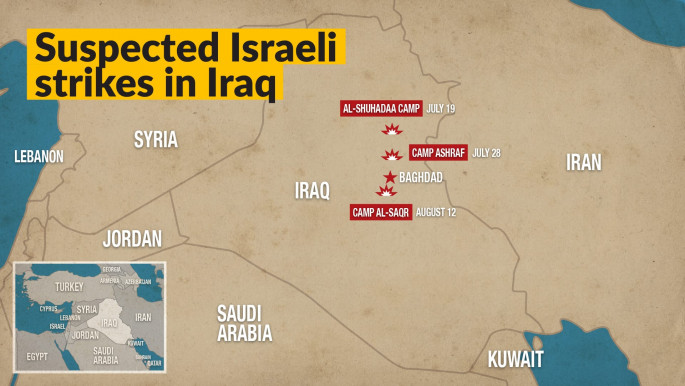Iraq 'blocks' foreign military planes from its airspace after suspected Israeli strikes on Iran-backed militias
Iraqi Prime Minister Adel Abdul Mahdi has decided to suspend all licences for foreign military aircraft following blasts at Iranian-backed militia based caused by a suspected Israeli airstrike, a statement by the Iraqi Joint Operations Command said.
The suspension came in response to the suspected airstrike on the Al-Saqr weapons depot, which belonged to an Iran-backed Iraqi Shia militia, part of the quasi-official Popular Mobilisation Forces.
ImageSat, an Israeli satellite observation company, earlier said an airstrike was probably the cause of the large explosion at the Al-Saqr weapons depot southwest of the Iraqi capital Baghdad which happened on Monday.
One person was killed and 29 wounded in the alleged strike.
Iraq's former Deputy Prime Minister Baha Al-Araji suggested on Twitter that Israel was behind the suspected airstrike,
"We believe they are weapons we were holding onto for a neighbouring state and they were targeted by an oppressive colonial state on the basis of a treasonous Iraqi act", he wrote on Tuesday.
Israel has been blamed for recent strikes against Iranian-backed Iraqi militias in the country, which could mark a shift in its focus from sites occupied by Iran-backed militias in Syria.
On July 19, an alleged airstrike hit the Al-Shuhadaa base near Amerli in north-central Iraq and on July 28 another alleged strike hit Camp Ashraf, 80 kilometres from the Iran-Iraq border.
An analysis published in The New Arab at the time posited the possible use of Israeli long-range drones in the attacks.
Read also:
Did Israeli long-range drones bomb Iran-linked targets in Iraq?
It is not clear whether the suspension of licences for foreign military aircraft includes those for coalition fighter jets taking part in the war against the Islamic State (IS) group, which has not officially been concluded despite IS' defeat.
"Any planes moving in violation [of this decision] will immediately be dealt with as enemy planes by air defences", the Iraqi Joint Operations Command statement said, adding that a full investigation would now take place into the Al-Saqr incident.
Alaa Al-Qaisi, an expert on Iraqi affairs, told The New Arab's sister Arabic-language publication: "Iraq has given an open licence to the international coalition, which consists of a number of countries, to take part in combat operations in Iraq. It has also given a licence to Russia in 2016 and to Iran before that".
He doubted that Iraq would be able to enforce its new decision, however, saying: "Iraq currently doesn’t have the means or capacity to enforce its sovereignty. It doesn’t have a detection or early warning system and has depended on the US in this regard for years."
The statement also noted that storing weapons without permission from the state, as the militia had done, was “unauthorised” and said that weapons depots and camps belonging to the army, police and Popular Mobilization Forces would be moved out of major cities by the end of August.
The Al-Saqr weapons depot, which was formerly a US military base, had been occupied by the “Sayed al-Shuhadaa Brigade", a militia supported by the Iranian Revolutionary Guard.





 Follow the Middle East's top stories in English at The New Arab on Google News
Follow the Middle East's top stories in English at The New Arab on Google News
![The UAE is widely suspected of arming the RSF militia [Getty]](/sites/default/files/styles/image_330x185/public/2024-11/GettyImages-472529908.jpg?h=69f2b9d0&itok=Yauw3YTG)
![Netanyahu furiously denounced the ICC [Getty]](/sites/default/files/styles/image_330x185/public/2024-11/GettyImages-2169352575.jpg?h=199d8c1f&itok=-vRiruf5)
![Both Hamas and the Palestinian Authority welcomed the ICC arrest warrants [Getty]](/sites/default/files/styles/image_330x185/public/2024-11/GettyImages-2178351173.jpg?h=199d8c1f&itok=TV858iVg)